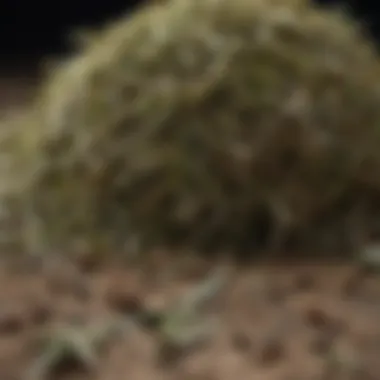Herbal Teas for Hair Growth: A Scientific Perspective


Intro
The quest for luxurious hair has intrigued many individuals. Often, the solutions sought are not found in high-end products but in everyday consumables such as tea. Herbal teas, well-known for their numerous health benefits, will be covered in this exploration. Particularly, their potential effects on hair growth warrant a closer look.
This demands a multipronged approach, linking ancient practices to modern evidence. Scientific studies have emerged, suggesting that some herbal teas may possess compounds beneficial for hair vitality and health. Furthermore, expert insights augment the understanding, driving home the need to balance personal routines with nutritional choices.
This comprehensive analysis will guide you through the connections between specific herbal teas and the proliferation of healthy hair. Each section aims to unravel methodologies, efficacy, and credible applications.
Beauty Tips and Tricks
Accompanying the consumption of herbal teas, adopting specific beauty tips can optimize hair health further. The following sub-sections serve practical information inline with popular methods of enhancing hair appearance.
Skincare Routine Tips
While primarily focused on hair, skincare plays a critical role in overall beauty. A clear face often complements beautiful hair. Hydration is vital, not only with beverages like herbal tea but through a suitable moisturizing regime. Communicating with a dermatologist will highlight relevant products, tailored to unique skin needs. Incorporating tea-infused products may also be beneficial.
Haircare Hacks
It's essential to integrate teas that support hair health into your daily routine.
- Green tea, noted for its antioxidant properties, may counter hair loss by blocking dihydrotestosterone (DHT).
- Hibiscus tea has amino acids and vitamins aiding in strengthening hair roots.
- Nettle tea supports circulation, thus fostering growth.
These herbal options are paramount for sustained hair improvement, and knowledge is a resource that creates an advantage over common practices. The methodical inclusion of teas might lead to significant changes over time.
Makeup Application Techniques
Though the focus is primarily on hair, beauty spans multiple facets. Employing simple yet effective makeup techniques can bring unity to your appearance. Using minimally invasive makeup that enhances one's natural beauty trumps artificial enhancements.
Scientific Evidence on Teas and Hair Growth
While herbal teas are beneficial, sole reliance on them isn't wise. Examining and collating scientific research demonstrates acceptable correlations yet requires pragmatic outcomes. Diligence in studying the ingredients' properties forms the bedrock for understanding their effects on hair growth and health. Should one deeply value holistic health and beauty, professional guidance underscores every practice, epitomizing the phrase that knowledge dispels ignorance.
Everything considered, herbal teas can feature prominently in beauty routines aimed at improved hair growth and health.
Prolusion to Hair Growth and Nutrition
Hair growth is a complex process influenced by various factors, including nutrition. Understanding this connection is essential for anyone looking to enhance their hair vitality. Proper nutrition forms the backbone of any effective hair care regimen. Nutritional deficiencies can lead to hair loss and poor scalp condition. This section outlines the importance of specific nutrients for hair growth and highlights how they can be incorporated into one's diet effectively.
Importance of Nutrition in Hair Growth
Research indicates that features like iron, biotin, zinc, and proteins play crucial roles in hair health. For example, iron supports oxygen transport in the blood, which is critical for maintaining healthy hair follicles. Moreover, biotin assists in keratin production, the very protein that makes up hair strands. Deficits in these nutrients often correlate with thinning hair or hair loss.
Additonally, vitamins such as Vitamins A, C, and E promote proper scalp health. They facilitate proper blood circulation and help produce the oils needed for maintaining moisture in the scalp.
Balancing Nutrients with Herbal Teas
While the right diet is vital, the incorporation of herbal teas adds another layer to hair care. Herbal substances infused in tea often contain antioxidants, vitamins, and minerals that can support hair health and growth. These herbal remedies have traditionally been associated with many health benefits.
- Green tea, for instance, is known for its high content of catechins, which have been linked to prolonged hair growth cycles.
- Rooibos tea gets praised for its mineral composition that includes calcium, iron, and potassium, vital for hair strength.
- Hibiscus tea contains amino acids that produce keratin, directly benefiting hair structure and thickness.
In summary, a balanced approach incorporating both nutrition and the targeted use of herbal teas represents a potentially powerful tool for enhancing hair growth effectively. Engaging with this topic will provide pivotal insights to those passionate about improving their hair's vitality and overall health.
**Investing in nutrition can lead to significant improvements in hair condition, making this topic relevant for beauty enthusiasts and skincare aficionados alike.
Understanding the Basics of Hair Growth
Hair growth is a complex process that involves various biological mechanisms and influences. Understanding this process is crucial for identifying how tea can contribute to improved hair health. Many people seek natural solutions that foster hair growth and combat hair thinning. Teas can offer such solutions if their components stimulate the necessary physiological responses.
The Hair Growth Cycle
The hair growth cycle comprises three main phases: anagen, catagen, and telogen.
- Anagen: This is the growth phase. A hair can remain in this stage for several years, during which it grows approximately half an inch per month. The length of this phase can vary significantly among individuals.
- Catagen: The transitional phase occurs over a few weeks. Hair disconnects from the blood supply and prepares to shed. This stage results in a miniaturized follicle.
- Telogen: Known as the resting phase, this phase lasts around three months. At the end of this period, the hair follicle is triggered to shed the old hair and begin the cycle anew with a new hair strand.
A thorough understanding of each phase gives insight into the factors influencing hair health, including as nutrition and hormonal changes. It also clarifies how specific ingredients in teas could potentially support these growth phases.


Key Factors Influencing Hair Growth
Multiple aspects can influence the rate and quality of hair growth. Here are several important factors:
- Genetics: Your genetic makeup greatly determines how your hair grows, including thickness and growth rate. Some individuals may naturally have thicker and longer hair due to inherited traits.
- Nutrition: A diet rich in vitamins and minerals promotes healthier hair. Micronutrients like biotin, vitamin E, and iron are crucial for optimal hair follicle function.
- Hormones: Hormonal imbalances often lead to hair loss or alteration in growth patterns. Conditions such as polycystic ovary syndrome (PCOS) can deeply affect female hair growth.
- Stress Levels: High stress promotes hair loss. Chronic stress leads to inflammation, affecting hair follicles and inhibiting new growth.
- Environmental Factors: Pollution and exposure to harmful chemicals can damage hair and slow its growth. A clean environment helps reduce these risks.
Understanding these key factors is essential for recognizing why certain herbal teas may have potential. Teas can provide necessary antioxidants, vitamins, and other beneficial compounds that positively influence these areas.
A balanced approach, combining herbal remedies and good lifestyle choices, can maximize hair health over time.
Through examining the specifics of hair growth and the numerous factors at play, it becomes evident how certain beverages, particularly herbal teas, supplement not only the aesthetic goals but contribute holistically to overall hair health.
Role of Herbal Remedies in Hair Care
Herbal remedies play a significant role in hair care due to their time-honored traditions and adaptogenic properties. Many cultures have cherished herbal teas not just for their delightful flavors, but also for their potential health benefits, including promoting healthier hair growth. Incorporating these remedies into hair care can allow individuals to explore the potent effects of nature in addressing hair concerns and enhancing overall scalp health.
The historical context reveals that many societies have recognized the efficacy of herbs in beauty and personal care. Historical texts document the uses of plants such as nettle, hibiscus, and green tea for managing hair issues. These remedies contain vitamins, minerals, and antioxidants paired with naturally occurring compounds that target root causes of hair weakening and loss.
Benefits of herbal remedies include:
- Rich in antioxidants: Herbs combat oxidative stress, improving follicle function.
- Anti-inflammatory properties: Reducing inflammation fosters healthier scalp conditions.
- Nutrient-dense: Essential vitamins, such as A, C, E, and B-complex vitamins, bolster hair strength and growth.
- Improved circulation: Certain herbal teas can stimulate blood flow to the scalp, which supports hair health.
However, incorporating herbal teas into a hair-care regimen warrants an understanding of individuals’ specific hair types and concerns. Tailoring usage ensures one maximizes benefits while minimizing possible adverse reactions. Individual differences in lifestyle, diet, and even susceptibility to allergies necessitate careful consideration.
Traditional Uses of Herbal Teas for Hair Health
Herbal teas have a rich history of usage in various cultures, often referenced for their beneficial effects on hair. For instance, Hibiscus tea has been used for centuries in Indian traditions where it is believed to promote hair strength and prevent premature graying. Its natural acids help to preserve the scalp's acidity balance and contribute to a shinier, resilient mane.
Another notable tea is roobios, known for its antioxidant properties. Traditionally appreciated in South African folklore, rooibos is regarded for its ability to protect against sun damage and soothe irritation, supporting hair health in harsh climates.
In Chinese herbal medicine, green tea is celebrated for its wealth of catechins that notably metal auxins, which help regulate hair growth effectively. This tea serves as both a refreshing beverage and a root-health formula across diverse cultures.
The collective knowledge regarding these herbal teas not only sings of their number of benefits but reinforces the idea of embracing nature in achieving responsive hair care goals. To discover potent formulations, one can reflect on these traditional practices that seamlessly mingle within both ancient and modern contexts. Incorporating a tea made from these ingredients may enrich your hair growth regimen naturally.
Popular Teas Associated with Hair Growth
The connection between tea and hair health is gaining traction among beauty enthusiasts who seek natural solutions for enhancing hair growth. Herbal teas are not just beverages; they can be viewed as potent elixirs that may contribute to stronger and healthier hair. Each type of tea brings unique properties that may support this goal in various ways. While scientific evidence continues to evolve, many people lean on experiences and natural remedies like these teas.
Taking regular account of specific teas can help those focused on beautifying their tresses embark on a more effective hair care routine. This section explores some notable teas associated with hair growth, warranting a closer look at how they might benefit the scalp and hair.
Green Tea and Its Benefits
Green tea stands out for its high concentration of epigallocatechin gallate (EGCG), a compound implicated in promoting cellular function within hair follicles. Evidence suggests that EGCG might aid in prolonging the hair growth phase by blocking dihydrotestosterone (DHT). This hormone can contribute to hair loss.
Additional benefits of green tea also encompass antioxidant properties, which can mitigate oxidative stress on scalp cells. Drinking green tea or directly applying it to the scalp can potentially boost hair vitality.
- Key benefits of green tea include:
- Enhancing hair shine
- Prolonging hair growth cycles
- Fighting free radical damage
Rooibos Tea: A Nutrient-Rich Option
Rooibos tea is known for its rich mineral profile, containing high levels of calcium, potassium, and zinc. These elements could bolster hair follicles, promoting overall hair integrity and preventing breakage. Rooibos is also caffeine-free, making it a suitable choice for individuals sensitive to stimulants.
An infusion of rooibos can be made with gentle heat and steeped for an extended period. Beneficial for scalp hydration, it may also create an environment that favors hair growth.
- Commonly noted properties of rooibos tea:
- Mineral-rich formula supporting hair structure
- Promotes a balanced scalp environment
- Anti-inflammatory might soothe irritated scalps
Hibiscus Tea and Hair Thickness
Hibiscus tea carries distinctive qualities vital for improved hair health. Rich in vitamin C, this tea serves to nourish hair while aiding in overall scalp health. It can help thicken hair strands and close the gap where fine hair may become brittle. Regular consumption could translate into more voluminous hair while minimizing hair shedding.
Additionally, hibiscus has conditioning properties; its extracts, when used in topical applications, can provide shine.


- Benefits associated with hibiscus include:
- Thicker and stronger hair strands
- Nutritional support due to high vitamin C content
- Natural conditioners for added shine
Nettle Tea for Scalp Health
Nettle tea is gaining popularity for its inclusion of key nutrients. Specifically, vitamins A and C, iron, and silica—all compelling for overall scalp health. Nettle may aid in improving circulation in the scalp, bringing necessary nutrients directly to hair follicles. This could in turn promote fuller, healthier hair growth.
Furthermore, nettle's anti-inflammatory properties may minimize scalp itchiness and redness, offering comfort to those with sensitive scalps.
- Notable attributes of nettle tea:
- Promotes blood circulation for hair follicles
- Contains essential vitamins for hair vitality
- Aids in addressing various scalp irritations
Scientific Evidence Supporting Hair Growth from Tea
The exploration of herbal teas in the context of hair growth is supported by scientific research and inquiries into the nutritional benefits these teas offer. Various studies focus not solely on anecdotal evidence but also provide empirical data regarding tea consumption and its potential effects on hair vitality. This section discusses relevant facets of scientific evidence relating to the hair-enhancing characteristics of several herbal teas.
Research Studies on Herbal Teas
Research into herbal teas has brought forth insights applicable to overall health, with specific attention to hair growth.
Several studies highlight how certain compounds in these teas, like antioxidants, may directly influence hair viability.
Factors to consider when examining the research include:
- Anti-inflammatory Properties: Some teas possess natural compounds that fight inflammation. This action can improve scalp health, a critical factor affecting hair growth.
- Antioxidants: Many herbal teas, such as green tea, are rich in antioxidants like epigallocatechin gallate (EGCG). These antioxidants can eliminate harmful free radicals, which have defined roles in halting hair growth.
- Nutrient Density: Herbal teas often contain vitamins and minerals that aid the hair's overall condition. For instance, hibiscus tea offers vitamin C and amino acids known to support keratin production in hair, contributing to stronger strands.
- Hormonal Balance: Some constituents of herbal teas can speak to hormonal regulation within the body. For example, nettle tea is hypothesized to mitigate the effects of dihydrotestosterone (DHT), a hormone associated with hair thinning.
While substantial evidence exists, researchers encourage active exploration of methodologies related to tea patterns and hair care sustainability among general consumers.
“Incorporating herbal teas into one’s diet should not be viewed as a sole remedy for hair growth but rather a supportive measure, alongside a holistic approach.”
The variables within different tea types create a complex landscape; thus, the need for further scientific examination cultivates exciting possibilities for tea as a facilitator of improved hair health. It requires engagement with current sources and professional consultation to define personal experiences.
How to Incorporate Tea into Your Hair Care Regimen
Incorporating herbal tea into your hair care regimen can be a beneficial practice. This section highlights methods through which tea can improve hair health, detailing examples that enthusiasts can explore and integrate into their routine. Tea can yield significant external and internal benefits which can boost both hair strength and appearance.
Brewed Vs.
Infused: Which is Better?
When deciding on how to use tea for hair health, understanding different preparation methods is crucial. Brewed tea typically involves steeping tea leaves in hot water. This process extracts nutrients efficiently, making the tea ready for drinking or topical application. Conversely, infusion entails allowing the herbs to steep longer, cultivating a more concentrated and potent extraction over time.
Many hair care enthusiasts prefer the infused method, as it provides a richer nutrient profile. An infused solution, rich in nourishment, can be great for scalp treatments. The choice depends largely on personal preference and the specific benefits desired for hair growth. Both methods hold unique advantages, giving individuals flexibility.
Recipes for Hair Growth Teas
Creating effective hair growth teas is an enjoyable way to explore herbal remedies. Here are popular recipes:
Green Tea Elixir
- Ingredients: 2 bags of green tea, 2 cups of boiling water.
- Instructions: Steep the bags for around 10 minutes. Once cooled, spritz onto scalp and massage.
Nettle and Hibiscus Tea Blend
- Ingredients: 1 tablespoon dried nettle leaves, 1 tablespoon dried hibiscus flowers, 2 cups of boiling water.
- Instructions: Combine ingredients and let steep for 15 minutes. Consume or apply.
Rooibos Concentrate
- Ingredients: 2 bags of rooibos tea, 2 cups of boiling water.
- Instructions: Brew for about 10-15 minutes. After cooling, use topically to strengthen threads.
These recipes illustrate multiple avenues for experimenting with tea. Finding combinations that suit personal taste while enhancing hair health can greatly enrich the hair care routine.
Best Practices for Consumption


In order to maximize the benefits of tea for hair growth, the following best practices can be useful:
- Hydrate: Drink sufficient water throughout the day. Hydration supports hair health significantly.
- Frequency: Aim for consuming tea daily or a few times a week. Consistent intake can amplify the effects seen.
- Nut'ri'tion Balance: Pair tea with overall good nutrition. Emphasis on vitamins and minerals supports hair effectively alongside tea.
- Monitor Reactions: Pay attention to body responses, especially if trying new teas. Ensure there are no adverse effects like allergies or irritations.
Incorporating tea into hair care does not have to be complex. Hashing together a strategy that includes drinking nutrient-rich herbal teas regularly will likely yield noticeable improvements in hair health and growth. This step solidifies the holistic approach to hair maintenance by merging internal well-being with topical applications.
Potential Side Effects and Considerations
It is crucial to acknowledge the potential side effects and considerations when discussing herbal teas and hair growth. While many teas offer various benefits, improper usage or individual sensitivities can lead to adverse reactions. This section aims to shed light on common allergies and important health consultations regarding herbal teas.
Common Allergies and Reactions
Herbal teas can trigger allergies in certain individuals. One of the most common culprits is chamomile tea, known for its calming properties but can induce allergic reactions, particularly in those sensitive to plants in the daisy family. Similarly, nettle tea might bring allergic responses in individuals who are allergic to stinging nettle
In addition to allergies, there exist non-allergic reactions as well. For instance, hibiscus tea can lower blood pressure. Those already diagnosed with hypotension may find risks in consuming this tea excessively. Understanding these reactions helps persons make informed choices.
Symptoms of Allergic Reactions:
- Skin rashes
- Itching
- Difficulty breathing
- Swelling of the face or throat
If these or any unusual symptoms arise, discontinue using the tea and seek medical assistance immediately.
Consultation with Healthcare Professionals
Before introducing herbal teas into your daily regimen, especially for hair growth, it is advisable to consult a healthcare professional. This is crucial for individuals with underlying health issues or those already taking medications. Some herbal ingredients may interact unfavorably with prescribed medications. A healthcare provider can offer personalized guidance, ascertain safety, and recommend appropriate intake levels.
When to Consult:
- If you are pregnant, as some herbs can have contraindications.
- If you have a chronic illness, particularly liver-related conditions.
- If you are on medications that could interact with herbal compounds.
Knowing when to seek advice is essential in maintaining health while exploring natural remedies for hair vitality. Understanding the potential impacts and interactions can help in harnessing the benefits of herbal teas effectively.
Nutrition and Lifestyle Choices
Nutrition and lifestyle choices are essential in fostering a healthy scalp and hair growth. The connection between what one consumes and their overall health cannot be denied. Nutrient-dense foods provide the necessary elements for robust hair.
Incorporating a variety of vitamins can prove beneficial. Biotin, zinc, iron, and omega-3 fatty acids contribute to strengthening hair strands and preventing excessive loss. Foods such as spinach, lentils, walnuts, and fish are great sources. Matching these foods with herbal teas can multiply the benefits.
Aside from nutrition, the impact of lifestyle factors also cannot be overlooked. Regular exercise increases blood circulation, promoting a better supply of core nutrients to the hair follicles. Staying hydrated ensures optimal function of all systems as well.
Simple changes, such as adopting a more balanced diet or increasing physical activity, can yield profound results. Factors like getting enough sleep and avoiding excessive stress permit the body to perform at its best, thereby nourishing every strand of hair from inside out.
Integrative practices encourage being deliberate about what nourishes mind and body, leading to healthier, more vibrant hair.
Here are some effective tips for integrating holistc principles into hair care:
- Eat Balanced Meals: Ensure a total of varied nutrients each day.
- Stay Hydrated: Drink enough water daily to keep scalp hydrated.
- Reduce Stress: Incorporate stress management techniques.
- Regular Exercise: Engage in physical activities for optimal blood flow.
By emphasizing nutrition and practical life choices, anyone looking to enhance their hair growth can build a strong foundation that complements the external benefits of herbal teas, further solidifying the role tea plays in hair improvements.
Epilogue: The Role of Tea in Hair Growth
In concluding this comprehensive analysis, it is essential to underscore the importance of integrating herbal teas into one's hair care regimen. The exploration highlighted that various teas do not just serve as delightful beverages; they hold potential benefits that contribute to hair health and growth.
Specific Elements of Tea for Hair Care
Each tea discussed possesses intrinsic properties that support both scalp health and hair vitality. For instance, green tea is recognized for its high antioxidant content, particularly catechins, which are proven to combat hair loss. On the other hand, rooibos tea’s rich mineral profile can fortify hair strands and protect against environmental damage. Likewise, hibiscus tea is noted for its ability to enhance hair thickness.
Aside from the nutritional benefits, the process of brewing and applying tea can be a ritual of self-care. This holistic approach boosts not just physical appearance, but mental well-being as well. Incorporating teas into one’s routine adds a layer of indulgence, fostering a more mindful connection to the act of caring for hair.
“The journey of hair growth is as much about what you consume as it is about your overall well-being.”
Benefits to Note
- Nourishment: Herbs provide essential nutrients that can encourage stronger hair growth.
- Stimulating circulation: Some herbal concoctions enhance scalp blood flow, promoting stronger roots.
- Reduction in shedding: Many extracts are effective in minimizing hair fall through natural remedies instead of reliance on synthetic solutions.
Considerations about Tea and Hair Growth
While the advantages of these teas are compelling, one must also be aware of potential allergies or sensitivities. It is critical to consult healthcare professionals, especially for individuals predisposed to allergic reactions. Furthermore, overconsumption can lead to unintended side effects. Moderation is key.
In summary, the intertwining of nature’s bounty with hair care opens a route toward lasting hair vitality. Herbal teas such as green tea, rooibos, hibiscus, and nettle offer invaluable resources for enhancing not just hair but overall wellness. The insights contained herein serve to guide those on their journey toward improved hair health through mindful consumption of these natural beverages.







